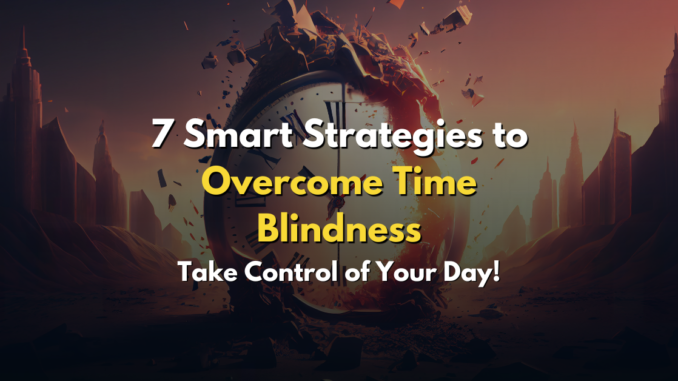
Have you ever lost track of time while working on something or found yourself constantly running late, no matter how hard you try to be on time? If so, you might be experiencing something called time blindness. It’s a quirky little phenomenon that messes with your ability to perceive and manage time. While it’s often linked to ADHD and other conditions, anyone can experience it under certain circumstances. Let’s break down what time blindness is all about, its causes, impacts, and how you can manage it, so you can get a handle on your schedule and maybe even get places on time!
Symptoms
Difficulty Estimating Duration of Tasks:
Ever start something and think it’ll take 20 minutes, only to find yourself still working on it an hour later? That’s a classic sign of time blindness.
Frequently Running Late or Missing Appointments:
You know those people who are always late, no matter what? It’s not just a bad habit; they might genuinely struggle to keep track of time.
Struggling to Manage and Prioritize Time Effectively:
It’s like juggling, but you can’t see the balls. People with time blindness often find it hard to decide what to do first and how long each thing will take.
Feeling Surprised by How Much or How Little Time Has Passed:
Have you ever looked at the clock and thought, “How is it already 3 PM?!” or “It’s only been five minutes?” That’s time blindness sneaking up on you.

Causes
ADHD:
Folks with ADHD often have executive function issues, which includes keeping track of time. Their brains are wired differently, making it tough to manage time like others do.
Other Conditions:
Time blindness isn’t exclusive to ADHD. People dealing with depression, anxiety, or certain neurological conditions can also experience it.
General Factors:
Even without a specific condition, stress, tiredness, or a lack of routine can throw off your sense of time. It’s like your internal clock gets out of sync.
Impact
Professional:
Struggling with time can be a big deal at work. Missing deadlines, being late to meetings, or underestimating project durations can all cause issues.
Personal:
Time blindness can strain relationships. If you’re always late or forgetting plans, friends and family might get frustrated, even if it’s not your fault.
Daily Life:
Everyday tasks can become a challenge. Things like cooking, cleaning, or even just getting ready in the morning can take way longer than they should.
Follow the Dnyan Power: Inspired Life channel on WhatsApp to get regular updates and read insightful articles everyday!
Management Strategies
External Aids:
Alarms, reminders, and timers are lifesavers. Setting multiple alarms or using apps to remind you of tasks can help keep you on track.
Structured Schedules:
Creating a detailed daily routine can be super helpful. Having a clear plan for your day helps make the flow of time feel more manageable.
Break Tasks into Smaller Steps:
Big tasks can be overwhelming. Breaking them into smaller, more manageable chunks can make it easier to estimate and manage your time.
Professional Help:
Seeing a therapist or coach who specializes in time management can make a world of difference. They can offer personalized strategies and support.
Research and Understanding
Ongoing Research:
Scientists and psychologists are still studying time blindness to understand it better. Research, especially related to ADHD and other cognitive conditions, is ongoing and helping develop better ways to cope with and treat it.
Developing Better Strategies:
The more we learn about time blindness, the better tools and strategies we can create to help those who struggle with it manage their time more effectively. Till then I have put together a basic schedule to manage time blindness, you can change it however you want. This is just an outline.

Morning Routine
Wake Up and Morning Prep (7:00 AM – 7:30 AM)
- Set an alarm and place it across the room to ensure you get up.
- Use a smart light that gradually brightens to simulate sunrise, making waking up easier.
- Use a morning checklist for hygiene tasks (brush teeth, shower, etc.).
Breakfast and Planning (7:30 AM – 8:00 AM)
- Prepare a simple, healthy breakfast.
- Spend 5-10 minutes reviewing your day’s schedule. Use a planner or an app to outline your tasks.
Work/School Routine
Morning Work Block (8:00 AM – 10:00 AM)
- Focus on the most important task first. Use a timer (like the Pomodoro Technique: 25 minutes of work, 5-minute break).
- Avoid multitasking to maintain focus.
Short Break (10:00 AM – 10:15 AM)
- Step away from your workspace. Stretch, grab a snack, or take a quick walk.
Second Work Block (10:15 AM – 12:15 PM)
- Continue with priority tasks. Use a timer to keep track of time.
Midday Routine
Lunch and Relaxation (12:15 PM – 1:00 PM)
- Take a full break for lunch. Avoid working while eating.
- Spend a few minutes doing something relaxing, like reading or listening to music.
Afternoon Routine
Afternoon Work Block (1:00 PM – 3:00 PM)
- Work on secondary tasks or continue with remaining priority tasks. Use the timer method again.
Short Break (3:00 PM – 3:15 PM)
- Another quick break to recharge. Walk around or chat with a colleague or friend.
Final Work Block (3:15 PM – 5:00 PM)
- Wrap up any outstanding tasks. Start preparing for the next day by making a to-do list.
Evening Routine
- Wind Down from Work (5:00 PM – 5:30 PM)
- Tidy up your workspace. Reflect on the day’s accomplishments.
- Dinner and Leisure (5:30 PM – 7:00 PM)
- Prepare and eat dinner. Spend some quality time with family or engage in a hobby.
Night Routine
- Evening Relaxation (7:00 PM – 9:00 PM)
- Engage in relaxing activities. Limit screen time to reduce blue light exposure.
- Prepare for Bed (9:00 PM – 9:30 PM)
- Create a bedtime routine (skincare, brushing teeth, etc.). Use this time to unwind further.
- Bedtime (10:00 PM)
- Aim to go to bed at the same time each night to establish a routine. Use a sleep tracker if needed.
Tips and Tools
- Timers and Alarms: Use multiple alarms for important tasks and breaks.
- Calendars and Planners: Digital calendars with notifications can be very helpful. Sync them across your devices.
- Task Lists: Break tasks into smaller, manageable steps. Use apps like Todoist or Trello.
- Mindfulness: Practice mindfulness or meditation to improve focus and reduce anxiety about time.
- Professional Help: Consider working with a coach or therapist who specializes in time management.
This routine can be adjusted based on your personal schedule and preferences. Remember, the key is consistency and using tools that help you stay aware of time.
Conclusion
Whether it’s due to ADHD, other conditions, or just the hustle and bustle of daily life, time blindness can be a real challenge. But don’t worry, with some handy strategies like using reminders, sticking to a schedule, breaking tasks into smaller steps, and maybe even getting some professional help, you can manage your time better. Remember, you’re not alone in this, and with a bit of effort and the right tools, you can keep those minutes from slipping away. Time to take control of your clock!
Content on this blog, including text, some images, and other creative works, is the intellectual property of Dnyan Power and is protected by copyright law. Unauthorized use or reproduction of any content without prior written permission is strictly prohibited. For inquiries or permissions, please Contact Us or email us at quantumhypnosisplr@gmail.com

Leave a Reply